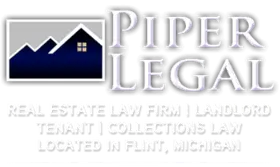Michigan Landlord Tenant Attorney
A Strong Advocate For Landlords’ Rights Across Michigan
Do you need assistance crafting a residential or commercial lease agreement to ensure your rights and interests are protected as a landlord?
Are you dealing with a tenant who cannot pay rent and would like to know what legal options are available to you?
Has a disgruntled tenant threatened to file a lawsuit?
Helping Landlords Manage Their Real Estate Portfolios
Being a landlord in Michigan offers great rewards but also creates great risk – not to 
mention a few headaches!
Whether you own single or multi-unit residential or commercial real estate properties, it’s vitally important to have a firm grasp on the state’s landlord-tenant law.
As a residential property owner, you are bound to face a variety of challenges:
- developing a legally binding rental or lease agreement
- choosing the right tenants
- making sure your property complies with local housing codes
- dealing with payment issues from tenants
- lease violations
- and much more
As a commercial property owner or investor, you may encounter:
- instability in the market
- rising property taxes and insurance premiums
- resistance from neighboring property owners about zoning ordinances
At Piper Legal, we help landlords navigate complex real estate laws and provide effective legal solutions to make sure your investments are protected and poised to grow.
We want you to have reliable cash flow and fewer vacancies. That’s why we’ve created a proprietary portal to expedite the court process for landlords.
Online Eviction Process in Michigan:
Click here to get started with an online eviction filing in Michigan, or give us a call at (810) 235-2558 to learn how we can help you.
Full Service Representation For Landlords
Piper Legal is dedicated to providing exclusive representation to landlords at every stage of landlord/tenant, landlord/business, buyer/seller relationships and offers services to tackle any issues you may face, including:
- Drafting, negotiating and reviewing Residential and Commercial leases
- Land Contracts
- Eviction procedures from start to finish
- Tenant screening
- Resolving complex landlord/tenant disputes, including but not limited to:
- non-payment of rent, delinquent payments
- breach of lease
- termination of lease
- security deposits
- property damage/repair obligations
- criminal activity
- illegal sublets
- refusal to vacate
- lead-based paint disclosure
- Defending against claims brought forth by disgruntled tenants for wrongful eviction, premises liability, discrimination, etc.
The Importance Of Building An Airtight Residential Lease Or Rental Agreement
A well-written rental or lease agreement can protect your assets and reduce the risk for  everyone involved.
everyone involved.
If the rules are explicitly outlined, there will be little room for dispute or blame if/when a conflict arises.
The primary purpose of a residential lease agreement is to:
- designate the amount of rent
- declare rights and remedies between landlord and tenant
- declare landlord’s obligations and remedies in case of a default by the tenant
Michigan’s laws for residential leases are very strict and pro-tenant. Piper Legal has the expertise needed to make sure your lease complies with federal, state and local laws, ordinances and regulations.
We know what you are legally required to disclose, as well as what clauses are illegal and could get you into trouble.
Required Landlord Disclosures In Michigan
The Michigan Truth in Renting Act (Act 454 of 1978, MCL 554.631 to 554.641) requires landlords to disclose certain key information to tenants in a residential lease agreement including:
- Move-in checklist
- Name and signature of landlord and tenant
- Address of property
- Rent amount to be paid:
- how frequently
- when and where it is to be paid (there are no limits to how much a landlord can charge in Michigan since there are no communities with rent control in the state)
- Starting and ending dates, if it is a fixed-term tenancy
- Landlord’s mailing address
- Amount of the security deposit, if any
- Name and address of the financial institution holding the security deposit
- Notice of the tenant’s obligation to provide a forwarding address to the landlord within 4 days of terminating the tenancy
- Who is responsible for paying utilities
- Repair and maintenance responsibilities
- Eviction procedures
- Domestic violence situations
- Amount of notice landlords must provide to increase rent
- Any other terms and conditions that the landlord and tenant agreed to
Security Deposit Law In Michigan
As a landlord in Michigan, you can charge a tenant a maximum of one and a half month’s rent as a security deposit. You can store your security deposit in an escrow account or surety bond.
Within 14 days of the tenant’s move-in date, you must provide a written notice detailing the tenant’s obligation to provide a forwarding address within 4 days of their move-out date.
When Do I Have To Return The Security Deposit?
You have 30 days from tenant move-out to return the tenant’s security  deposit to the forwarding address provided.
deposit to the forwarding address provided.
If you have made any deduction from the security deposit, you must include an itemized list of the deductions along with the amount withheld or approximate cost to repair.
You must include a check or money order for the difference between the original security deposit and any deductions made.
Are There Any Conditions That Would Allow Me To Keep The Security Deposit?
You may be able to keep a portion or all of a security deposit for reasons such as:
- Unpaid rent
- Unpaid utility bills
- Damage in excess of normal wear and tear
- Breach of lease
Can I Ever Raise The Rent?
Yes, but only if it is done correctly. Usually, you cannot raise the rent until the lease ends.
There may be exceptions if it is stated in the lease that you can raise the rent due to rising utility costs or higher taxes, or if an additional tenant moves into the unit, for example.
A tenant’s rental period depends on how often he pays the rent. Therefore, if a tenant pays the rent monthly, you have to give at least one month written notice before you can legally charge more rent.
Landlord Evictions Process
The Eviction Process: Filing eviction notice in Michigan
Landlords must have a valid reason for terminating a tenancy before the end of the lease term.
term.
You are permitted to evict a tenant for reasons such as:
- nonpayment of rent
- destroying property
- excessive noise and disturbance of other residents
- unauthorized occupants
- pet violations
- health hazards created by the resident
- unlawful activities upon the premises
7-Day Notice To Quit
You must serve a 7-Day Notice To Quit to tenants who:
- have not payed rent
- created a health hazard
- damaged property
This lets them know they have 7 days to pay the overdue rent or vacate before legal action is taken.
Send my tenant a notice now
30-Day Notice
If the lease is month-to-month or there was a material breach of the lease, such as having unauthorized persons living on the property or by creating a nuisance, then the eviction notice would be 30 days.
Send my tenant a notice now
24-Hour Notice
If you have the appropriate Drug Free Addendum added to your lease agreement and you have filed a police report alleging that your tenant unlawfully possessed, manufactured, delivered, or sold controlled substance on the premises, you only have to give 24 hours notice.
Summons And Complaint For Eviction
If the tenant fails to comply and vacate the property, Piper Legal can help you take legal action.
We understand that the longer a tenant fails to pay rent, the more money you lose.
We will file and serve a Summons and Complaint in Eviction and a court hearing will be scheduled. If the tenant fails to appear on the date indicated on the Summons, the court will declare the tenant in default and award you possession of the property.
If the tenant does not move out within 10 days, a writ of restitution can be issued giving law enforcement permission to physically remove the tenant.
Is It Lawful For My Tenant To Break The Lease?
There are some exceptions to breaking a lease before the lease expires, such as:
- The tenant or tenant’s child is the victim of domestic violence, sexual assault or stalking
- Military duty
- Rental unit is unsafe or violates Michigan health and safety codes
- Tenants who have occupied their rental unit for more than 13 months may terminate the lease by a 60-day written notice if they have become eligible for subsidized senior citizen housing, or because they are incapable of living independently due to age or disability.
As the landlord, you would be responsible for finding a new tenant, but the previous tenant will be liable for rent until you fill the vacancy.
How To Avoid A Lawsuit
A tenant can sue you if:
- you do not follow proper eviction procedure
- you make illegal entry into a rental unit
- a person on the premises is injured because of dangerous conditions
First and foremost, make sure to have a written release.
In addition, there are other ways to safeguard against a lawsuit, including:
Have proper insurance
- Maintain sufficient property insurance at all times
Maintenance and repair
- Landlords must maintain and repair their rental properties. All amenities and appliances should be clean and in good working order, both at the beginning of the tenancy and for the duration of the tenant occupancy of the unit.
- Keep records of maintenance and repairs – move-in, move-out forms
Premises Liability
If someone is injured on your property because you failed to adhere to the standards outlined by your region, you may be held accountable for damages caused by your negligence.
Security deposits are another area of the law where landlords are being sued. Landlords must comply with the security deposit laws of the State.
- If there are deductions, make sure there is documentation of damage to the premises and repairs and provide those documents to the tenant within 21 days after the tenant vacates.
Discrimination
- develop brief nondiscriminatory written standards for their tenant intakes and document reasons for refusals
- never advertise in a discriminatory manner
- void any reference to anything regarding family relationships, sexual orientation and gender
Protect Your Interests With A Solid Commercial Lease
Commercial leases do not have the same protections residential leases have. They are also longer in duration, tenants often have more costs and expenses, and there are usually restrictions on how the premises can be used.
There  is no standard agreement, which is why there’s always a lot of negotiations involved.
is no standard agreement, which is why there’s always a lot of negotiations involved.
At its most basic, a valid commercial lease states:
- lease parties
- the property being leased
- the amount of rent to be paid
- a schedule of any rent increases
- the duration of the lease
Piper Legal recognizes the large investment you have made in time, energy and money in developing a property for lease. Our firm has successfully assisted many commercial landlords in their transactions with:
- businesses
- retail stores
- restaurants
- various other types of commercial establishments
- the negotiation of purchase/sale agreements, lease renewals and subleases.
Lease Provision Tips
- State the commercial purpose or permitted uses
- Identify the type of release:
- Full Service
- Gross
- Net
- Percentage
- Include a “Maintenance and Repair” clause which specifically outlines all parties’ obligations regarding the upkeep of the property
- Determine who will be responsible for property insurance
- Define who is responsible for property taxes
- Define spatial specifications – the square footage, borders, parking, and common areas
- The size and location of any signs needed for the business
- Zoning category based on type of business
If you are a residential or commercial landlord in Michigan, Piper Legal can provide legal assistance to help you maximize your investment and minimize risk.





